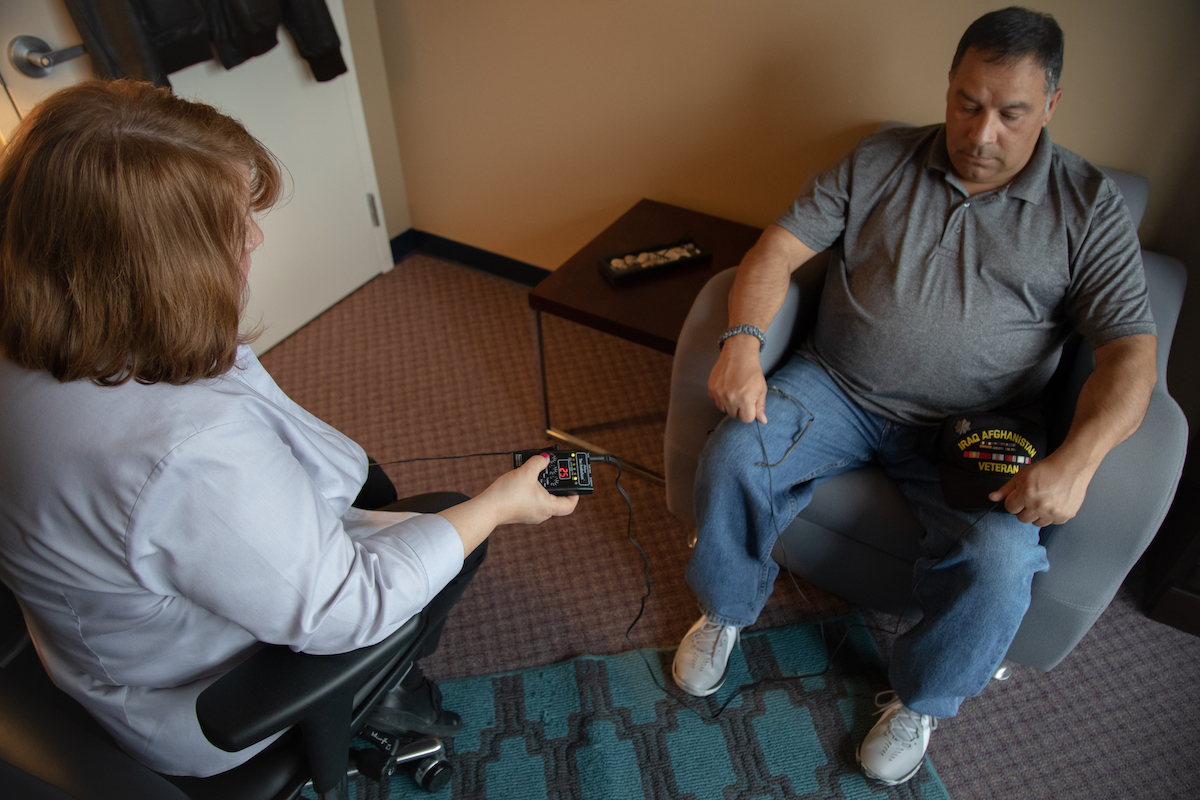How does PTSD treatment work?
Treatment can help you manage PTSD symptoms so you can feel better, build stronger relationships with the people you care about, and do more of the things that matter to you.
Treatment has been huge. Treatment has definitely helped me. Treatment has turned my life around.”
CPL Jeremiah Civil (US Marine Corps, 2001-2005) shares how treatment has made a positive change in his mental health and well-being.
PTSD treatment options
There are 2 main treatment options for PTSD: therapy and medication. Both can help Veterans heal and manage PTSD symptoms.
Therapy
The most effective treatment for PTSD is trauma-focused therapy. “Trauma-focused” means that when you talk to your therapist, you’ll focus on your memory of the traumatic event and what it means to you.
Focusing on your memories may sound scary — especially if you’ve been trying not to think about them. But revisiting the event with the help of a professional you trust can help you feel better.
When you can walk through it with a trained professional, they have a way of making you look at it from all the angles, not just the one perception you have. It allowed me to see things a little bit differently and make a little more sense of what happened that day.”
Reedy Hopkins (US Air Force, 1983-2011) shares how therapy helped him see things differently.
Your memory of the event will become less intense, so it won’t take up as much space in your mind — and you can focus on the things that matter to you.
By reliving some of the scariest moments of my life when I was in Iraq, you learn that it’s there, but the intensity of the memory goes away.”
SGT Andrew Reeves (US Army, 1999-2009) explains how therapy helped him process memories from his time in Iraq.

Learn more about THERAPIES THAT ARE PROVEN TO WORK
There are a few types of trauma-focused therapy that can help you manage your PTSD symptoms. Learn about each type of therapy from Veterans who’ve been there.
Medication
Medication can also help Veterans manage PTSD symptoms. Certain chemicals in our brains, called serotonin and norepinephrine, help us manage stress. Some people with PTSD may not have enough of these chemicals. Medications called SSRIs (selective serotonin reuptake inhibitors) and SNRIs (selective norepinephrine reuptake inhibitors) help to raise the level of these chemicals in your brain, so you’ll feel better.
I really struggled with medication for a long time. To me, having to be on medication meant I was really broken. So I would get on it and things would be better, and I would get off of it. Eventually I pushed through all of that and have since been able to lower my dosage of medication because I don’t need as much.”
Sherie Warner (US Army, 2001-2007) says it was hard to accept that she needed medication to help manage her PTSD symptoms.
How treatment can help
As you go through treatment, you’ll have fewer PTSD symptoms, and the symptoms you still have will be a lot easier to manage. When PTSD symptoms don’t take up as much space in your life, you’ll have more room for the things that matter to you — like relationships, interests, and goals for the future.
Boost your confidence
Sometimes PTSD symptoms can weigh you down. PTSD treatment can help you feel lighter and more confident in yourself.
I’ve learned to look at situations differently. Everything that has happened in my past made me who I am today. I’m very confident now. I’m very happy with who I am.”
Eddie Hoffman (US Marine Corps, 2001-2010) shares how treatment has helped him feel more confident.
Improve your relationships
In PTSD treatment, you’ll learn skills that will help you communicate better with the people you care about.
We became a much happier couple. We had some hidden problems once in a while. And more or less, [treatment] began to erase it from our daily lives, and we became more contented and very, very happy.”
Albert Perna (US Army, 1942-1945) explains how treatment has helped him improve his marriage.
Cope with life’s ups and downs
PTSD treatment can teach you new ways to cope with every challenges, like stressful situations in your relationships or work.
I don’t expect everything to go peachy keen because life has its ups and downs, but one of the most beautiful things is I don’t know if I could get angry anymore. And that’s something new to me, very new.”
Horace “Ace” Carter (US Army, 1977-1999) learned skills to help him cope and keep anger in check.
Find hope for the future
PTSD treatment can also give you hope, as you set realistic goals and start working toward the future that you’ve imagined.
I have hope for the future. I went through the treatment and stuck with it because I want to have kids. I definitely think things are going to get better.”
Laura Hendrixon (US Marine Corps, 2003-2007), explains how therapy has shifted her perspective on the future.
Are you ready for treatment?
When it comes to getting help for PTSD, it can be easy to second guess yourself — some days may seem fine, other days you may feel overwhelmed. So, when is the right time to start PTSD treatment? Clinical psychologist Ron Acierno might say it best:
If you’re feeling pain, you’re ready for treatment. If you can’t do the things you used to do before you served your country, you’re ready for treatment. Don’t wait until you feel ready.”
Ron Acierno, Clinical Psychologist
If PTSD symptoms are causing problems in your relationships or keeping you from doing the things you love, now is the best time to get help.
Learn more about therapies that are proven to work
Learn about different types of trauma-focused therapy for PTSD from Veterans who’ve been there.
Explore more videos about therapy
Learn more about therapy from professionals and Veterans.